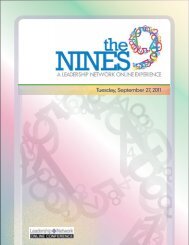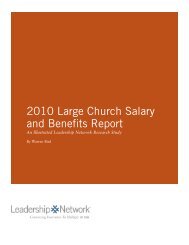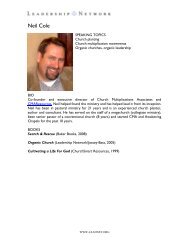ARE WE A PEOPLE AT HALF TIME? - Leadership Network
ARE WE A PEOPLE AT HALF TIME? - Leadership Network
ARE WE A PEOPLE AT HALF TIME? - Leadership Network
You also want an ePaper? Increase the reach of your titles
YUMPU automatically turns print PDFs into web optimized ePapers that Google loves.
Church Leaders<br />
<strong>Network</strong><br />
Brad Smith is<br />
the Director of<br />
the Church Leaders<br />
<strong>Network</strong>. He joined<br />
<strong>Leadership</strong> <strong>Network</strong><br />
in 1993 and provides<br />
leadership to the forums, networks<br />
Brad Smith<br />
of church leaders, <strong>Leadership</strong> Training<br />
<strong>Network</strong>, and new projects.<br />
NEXT...What is the purpose of the<br />
Church Leaders <strong>Network</strong><br />
BRAD...Our purpose is to discover and<br />
define the best practices of innovation,<br />
effectiveness and health in churches of<br />
all types, and provide peer-learning<br />
opportunities for leaders to learn from<br />
each other.<br />
NEXT...What is the key to the success of<br />
these networks<br />
BRAD...The key is finding the right<br />
church leaders and building networks<br />
around them. Without these key individuals,<br />
<strong>Leadership</strong> <strong>Network</strong> would be just another<br />
think tank or “we’ve got the answer”<br />
group. We really work hard to avoid that<br />
approach. We’ve also learned the art of<br />
finding interesting people and grouping<br />
them so there is enough sameness for<br />
dialogue, yet enough diversity to create<br />
a challenging learning environment.<br />
We connect people. They are the<br />
experts; we build the learning opportunity<br />
around them.<br />
NEXT...There are several types of<br />
church leader networks. How do they<br />
differ<br />
BRAD...Our first network is one that<br />
consists of large churches. Within that<br />
network, we have networks of senior<br />
pastors, executive pastors, and other types<br />
of local church staff groups. Then, we<br />
have a team ministry network. These are<br />
churches that are pursuing innovative lay<br />
mobilization and team ministry. We also<br />
have some new networks, led by Doug<br />
Pagitt. We are also just beginning networks<br />
of urban, minority, and ethnically<br />
diverse churches.<br />
NEXT...Explain how learning within a<br />
network takes place.<br />
BRAD...Most of the learning takes place<br />
in forums which are face-to-face meetings<br />
of key leaders in the network. If we do<br />
our job in selecting the right people to<br />
invite, the forums look easy. In most cases<br />
the participants establish their own<br />
agenda. In enhanced forums, we may<br />
bring in a key expert in the field to start<br />
the discussion at an advanced level, but<br />
we limit the “presentation” time, otherwise<br />
people get out their pens and turn off<br />
their brains. When the participants are<br />
the experts, they jump in with full brain<br />
energy and are challenged by new ideas<br />
and learn from each other and across<br />
denominational lines.<br />
For advanced learners, we find that the<br />
forums are often more helpful and<br />
timely than structured training programs.<br />
Among paradigm pioneers, by the time<br />
the innovation is recorded in a book, often<br />
the culture has already moved to make it<br />
obsolete.<br />
Bottom row, L to R: Doug Pagitt, Molly Smallen. Top Row, L to R:<br />
Carolyn Cochran, Brad Smith, Alex Landin, and Nancy Kiser<br />
NEXT...How do you account for the<br />
fact that people often describe<br />
<strong>Leadership</strong> <strong>Network</strong> as “unique”<br />
BRAD...<strong>Leadership</strong> <strong>Network</strong> seems to<br />
emphasize proactive spirituality. We<br />
promote strong leadership using proactive<br />
gifts in a manner that is dependent upon<br />
God to create supernatural results. We<br />
are not just the hard edge of leadership<br />
practices nor the soft edge of spiritual<br />
reflection. We weave the two together<br />
in a way that honors God-given<br />
leadership gifts, but doesn’t set them<br />
above the necessity that if God has not<br />
preceded the leader, his or her efforts<br />
are useless.<br />
NEXT...What about the next<br />
generation of church leaders<br />
BRAD...Doug Pagitt recently joined<br />
<strong>Leadership</strong> <strong>Network</strong> to lead our initiative<br />
in building a network of young leaders,<br />
both men and women, born after 1960<br />
who are the future. He’ll be continuing to<br />
identify and resource church planters,<br />
youth ministers, college ministers,<br />
ministries to Xers that are “churches<br />
within a church,” in addition to young<br />
senior pastors.<br />
NEXT...What is the biggest challenge<br />
for you now<br />
BRAD...One major challenge is that<br />
our culture is changing so fast that our<br />
church clients are constantly on the lookout<br />
for how they can proactively lead<br />
those changes in positive ways. That<br />
requires us to work overtime<br />
to continue to sort out the difference<br />
between a fad, a trend,<br />
a true innovation and the larger<br />
movement of God.<br />
NEXT...What really excites<br />
you about your job<br />
BRAD...It is great to be at a<br />
vantage point where you can<br />
see, on a daily basis, where<br />
God is at work and then help<br />
others to see that. In what<br />
other job do you get to see the<br />
best of the best - the best of<br />
what God is doing among<br />
denominations and beyond I am<br />
impacted every day, in very concrete<br />
terms, with all the good things God is<br />
doing and how awesome He is.<br />
4







